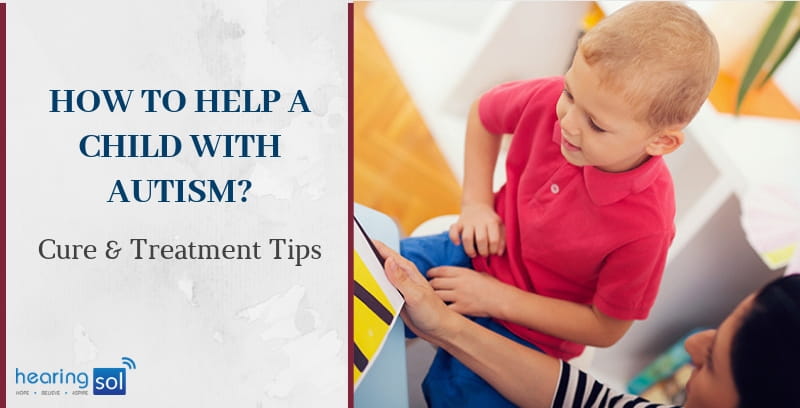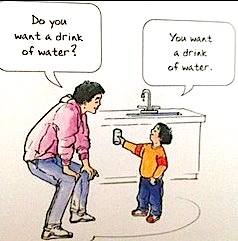
When caring for or working with a child deal with autism, parents may become frustrated with the child’s behavior. Behaviors can come on suddenly and last for hours.
So, it is hard to control or make the adult embarrassed or scared.
If you need any assistance or have a question about Autism, you can consult our HearingSol experts with your problem, feel free to call us on +91-9327901950. We are always here to help you.
Thus, autism is considered to be on a spectrum. This is because some people have only a few or mild symptoms while others have severe or many symptoms.
Learning all you can about the disorder-and where to get help-will ease your confusion and fear. It can also provide the tools you need to find the support that child with autism really needs.

Characteristics of Autism
Here are some of the characteristics mentioned below of children with autism to help you better understand the cause of the behavior. Few characteristics can also be common in very young children and emotional disabilities. Always keep in mind that all children with autism are different. Some may have only a few below, while others may have many characteristics.
- trouble recognizing another person’s opinion or understand a person’s feelings.
- difficulty taking sensory input in the usual way.
- difficulty switching from one activity to another, generally when they have to switch from something enjoyable to something unenjoyable.
- trouble working on or participating in activities with no clear ending.
- a need for a particular routine so that they know what to expect as they can become frustrated when things don’t go according to them.
All children’s have exceptional strengths as well. So it is extremely necessary to focus on these characteristics, let the kid know how proud you are of their efforts, and integrate strengths into learning and play.
Sometimes these characteristics lead to trouble at home or some other place which can be frustrating for the kid and the adults caring for them.
When Your Child Has Autism?
There are many things parents can do to help children with ASD(Autism Spectrum Disorder) to overcome their challenges. But it is also important to ensure you get the support you need.
Learn about autism – The more you know about ASD, the better equipped you will be to make informed decisions for your child. Learn about the treatment options, you can ask questions.
Become an expert on your child – Find out what triggers your child’s challenging or disruptive behaviors. If you understand what affects your child, you will be better at preventing situations or troubleshooting problems that cause trouble or difficulties.
Accept your child, quirks, etc. – Instead of focusing on how your autistic kid is different from other children and what he or she is “missing”, practice acceptance. Enjoy your child’s quirks, stop comparing them to other children, and celebrate their small successes.
Do not give up – It is impossible to predict the course of ASD. Do not jump to conclusions about how life is going for your child. Just like everyone, people with autism have an entire lifetime to grow and develop their abilities.
Intervention Programs To Cure Autism
In early intervention programs, therapists come at home in order to deliver services related to behavior during autism disorder. An early intensive inspection of behavior includes a child’s entire family, working closely with an expert team.
It can also involve parental leading therapy sessions under the complete supervision of the therapist.
Due to these programs, the child started developing good social and learning skills. Adolescents with autism enjoy transition services that promote a roaring maturation into independence and employment opportunities of adulthood.
Early Intervention Therapies That Are Currently Available
- Applied Behavior Analysis
- Early Start Denver Model
- Floortime, Pivotal Response Therapy
- Verbal Behavior Therapy
Treatment Choices For Toddlers & Educational Institution Kids
- Highly trained therapists and teachers deliver the intervention.
- Well-trained professionals assist with the intervention under the management of older skilled like an expert in autism medical aid.
- The child is given therapeutic activities for a minimum of 25 hours per week.
- The program provides the kid with opportunities to interact with developing fellows.
Parental Guide On How To Deal With Autism?
If you have recently learned that your kid has or might suffer from autism spectrum disorder. You are most likely questioning and worrying regarding what comes next. No parent is ever ready to listen to that a toddler is something instead of happy and healthy. Thus, there is no need to worry as there are many ways that can help children to acquire new skills and fight with developmental challenges.
Be Consistent: Children facing ASD have a tough time applying what they have learned in one setting. Suppose, your child used to do things using sign language at school but not at home. So, making consistency in your child’s atmosphere is the way towards reinforcing learning. Just keep noticing what therapists teach them at school and continue the same activities at home too.
Stick to a schedule: Try to make a proper schedule for your kid. For example meals, therapy, school, and bedtime and strictly follow them and make your child follow properly.
Reward good behavior: Whenever your children act efficiently or appropriately or acquire a new skill, try to appreciate them as more as possible.
Create a home safety zone: Arch out personal space in your home so that your child can feel secure and comfortable. This can be done by setting up boundaries in ways that can be understood by your child. Even Visual hints are much helpful.
Personalized Treatment
There are a number of treatments are available and it is difficult which one is right for your child to treat autism. It differs from person to person. So each individual requires a different method of treatment. The good treatment is a personalized treatment because you know your child better than anyone else.
- You know your child’s interests write it down.
- Prepare a good schedule.
- Try different activities and tasks.
- Engage your child in some activities because you are the one with whom your child spends a whole day.
- Start slowly and give a new task on a daily basis.
Choosing Autism Treatments
There is a confusing variety of approaches and therapies when it comes to autism treatment. Some therapies focus on reducing problematic behaviors and social skills, while others deal with sensory integration, food sensitivities, and emotional issues.
With so many choices, it is highly necessary to do your research, talk to autism treatment professionals, and ask questions. You don’t have to decide or choose just one type of therapy. The goal should be to treat your child’s unique array of needs and symptoms.
Keep in mind that the routine is important and the program should be designed in a way that can be persistent. Think about what behaviors and skills are most essential and treat those first. Because it may not be possible to tackle everything at once.
Do Not Wait For Diagnosis
As the parent of a child with ASD, the best thing you can do is to start your treatment right away. Don’t wait for an official diagnosis of autism. Seek help as soon as you suspect any difficulty. The earlier the child with ASD get help, the greater their chance of treatment of success.
Early medication is the most effective way to speed up your kid’s development and reduce the symptoms of autism over the lifespan.
That’s all in this article. If your child’s behavioral crises continue to be a problem, I urge you to consult a therapist who can customize a plan to improve your kid’s behavior. Or if you didn’t find any, you may also consult our experts by giving us a call on our toll-free +91-9327901950.
Read more about Autism:

 Reviewed by Mr. Ranjeet Kumar
Sr. Audiologist, Speech Therapist & Cochlear Implant Specialist, BASLP on
Reviewed by Mr. Ranjeet Kumar
Sr. Audiologist, Speech Therapist & Cochlear Implant Specialist, BASLP on